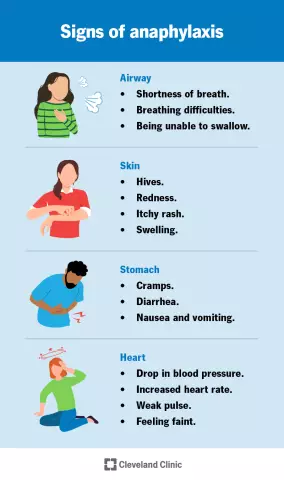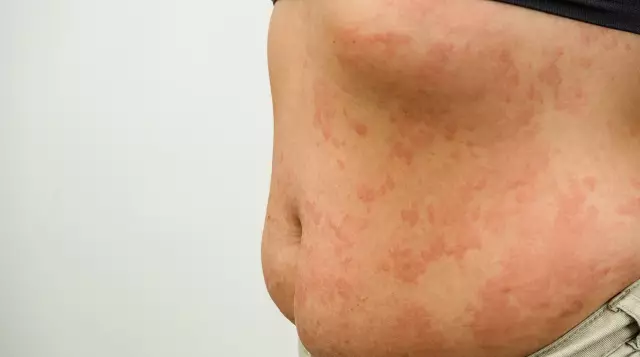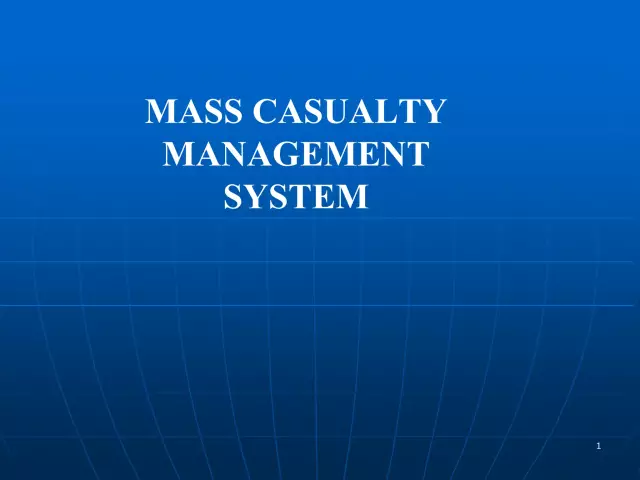- Author Rachel Wainwright wainwright@abchealthonline.com.
- Public 2023-12-15 07:39.
- Last modified 2025-11-02 20:14.
Pharyngotracheitis

Pharyngotracheitis is an inflammatory disease of the trachea and pharynx caused by staphylococcal or pneumococcal bacteria, viruses and fungi.
Causes and symptoms of pharyngotracheitis
Pharyngotracheitis is a complex disease with an inflammatory process in the mouth, pharynx and trachea. This disease is a combination of pharyngitis and tracheitis.
Pharyngotracheitis is caused by infections, polluted air, smoking, cold liquids, and the presence of certain foci of inflammation, including diseased teeth, otitis media, and rhinitis.
In adult patients, often the causes of pharyngotracheitis are toxic substances and complications after viral diseases.
Pharyngotracheitis symptoms include:
- pain, soreness and burning sensation in the throat;
- pain when swallowing, feeling of a lump in the throat;
- inflammation of the lymph nodes;
- high body temperature from 38 degrees and above;
- dry and hard cough.
Pronounced symptoms of pharyngotracheitis when examining the throat and pharynx are redness of the walls, inflammation of the mucous membrane and enlargement of the tonsils.
If pharyngotracheitis is combined with other viral diseases, then the symptoms are complemented by rhinitis, bronchitis, intoxication, muscle pain syndrome, weakness and skin rash.
In otolaryngology, there are two types of pharyngotracheitis - acute and chronic. Acute pharyngotracheitis is accompanied by high fever, attacks of severe dry cough and wheezing in the trachea.
Chronic pharyngotracheitis has mild symptoms, which manifests itself in the form of compression in the chest, hoarseness and redness of the larynx walls.
Progressive pharyngotracheitis causes inflammation of the tissues of the larynx and trachea, crusting and swelling of the throat. The disease can cause serious damage to the lymphatic system.
Pharyngotracheitis is actively manifested at night in the form of a strong cough with heavy sputum discharge.
In children, inflammation of the pharynx and trachea occurs against the background of a respiratory illness, causing a dull painful cough and pain in the chest. If the progression of pharyngotracheitis is not stopped, then bronchitis, asthma and pneumonia can develop.

With pharyngotracheitis, breathing is impaired and the immune system is weakened, and frequent coughing attacks can provoke swelling and muscle spasms.
Diagnosis of the disease
Pharyngotracheitis is diagnosed by a therapist and otolaryngologist after examination and pharyngoscopy. If necessary, additional diagnostic procedures are prescribed, including a smear for infections and ultrasound examination.
This disease from other inflammatory processes in the respiratory system (tracheitis, tonsillitis, pharyngitis, etc.) can only be distinguished by a professional medical specialist.
Pharyngotracheitis treatment
Pharyngotracheitis treatment begins with the intake of immunomodulatory drugs, which are aimed at eliminating the causes of the disease and restoring the normal state of the immune system.
To eliminate bacteria and fungal infections in the respiratory system, antibiotics of general and local action are prescribed, and effective antiviral drugs are prescribed for the treatment of viral pharyngotracheitis.
The toxic type of the disease must be treated with quitting smoking and avoiding the source of harmful toxic effects.
Inhalation, throat warming, aerosols and decoctions are prescribed as means of antibacterial therapy. Inhalation and warming up allow you to act directly on the foci of inflammation and eliminate them.
Treatment of pharyngotracheitis in the acute stage consists in taking expectorant drugs, antihistamines and antibacterial drugs.
Additional therapy should include warming compresses, foot baths, rinses with medicinal herbs and decoctions with chamomile, licorice and sage.
YouTube video related to the article:
The information is generalized and provided for informational purposes only. At the first sign of illness, see your doctor. Self-medication is hazardous to health!






